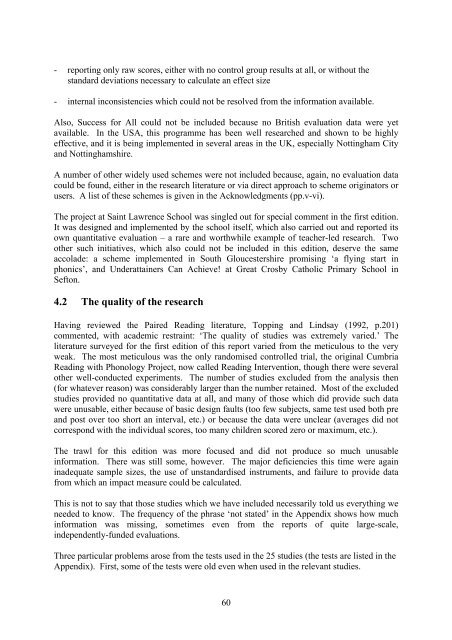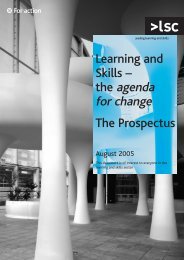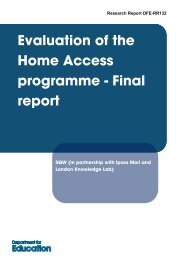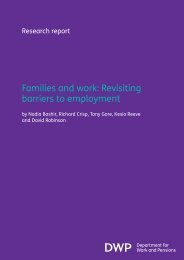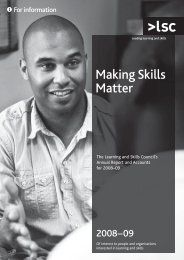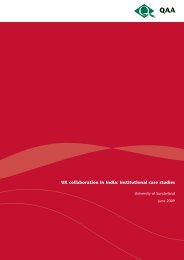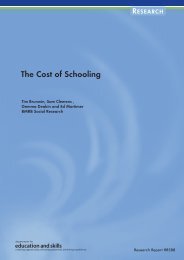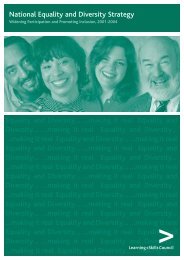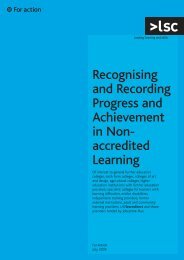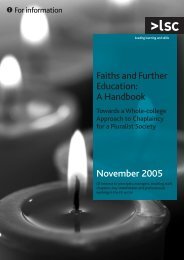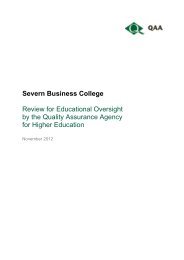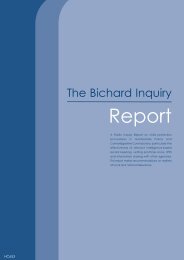What Works for Children with Literacy Difficulties? - Digital ...
What Works for Children with Literacy Difficulties? - Digital ...
What Works for Children with Literacy Difficulties? - Digital ...
Create successful ePaper yourself
Turn your PDF publications into a flip-book with our unique Google optimized e-Paper software.
- reporting only raw scores, either <strong>with</strong> no control group results at all, or <strong>with</strong>out the<br />
standard deviations necessary to calculate an effect size<br />
- internal inconsistencies which could not be resolved from the in<strong>for</strong>mation available.<br />
Also, Success <strong>for</strong> All could not be included because no British evaluation data were yet<br />
available. In the USA, this programme has been well researched and shown to be highly<br />
effective, and it is being implemented in several areas in the UK, especially Nottingham City<br />
and Nottinghamshire.<br />
A number of other widely used schemes were not included because, again, no evaluation data<br />
could be found, either in the research literature or via direct approach to scheme originators or<br />
users. A list of these schemes is given in the Acknowledgments (pp.v-vi).<br />
The project at Saint Lawrence School was singled out <strong>for</strong> special comment in the first edition.<br />
It was designed and implemented by the school itself, which also carried out and reported its<br />
own quantitative evaluation – a rare and worthwhile example of teacher-led research. Two<br />
other such initiatives, which also could not be included in this edition, deserve the same<br />
accolade: a scheme implemented in South Gloucestershire promising ‘a flying start in<br />
phonics’, and Underattainers Can Achieve! at Great Crosby Catholic Primary School in<br />
Sefton.<br />
4.2 The quality of the research<br />
Having reviewed the Paired Reading literature, Topping and Lindsay (1992, p.201)<br />
commented, <strong>with</strong> academic restraint: ‘The quality of studies was extremely varied.’ The<br />
literature surveyed <strong>for</strong> the first edition of this report varied from the meticulous to the very<br />
weak. The most meticulous was the only randomised controlled trial, the original Cumbria<br />
Reading <strong>with</strong> Phonology Project, now called Reading Intervention, though there were several<br />
other well-conducted experiments. The number of studies excluded from the analysis then<br />
(<strong>for</strong> whatever reason) was considerably larger than the number retained. Most of the excluded<br />
studies provided no quantitative data at all, and many of those which did provide such data<br />
were unusable, either because of basic design faults (too few subjects, same test used both pre<br />
and post over too short an interval, etc.) or because the data were unclear (averages did not<br />
correspond <strong>with</strong> the individual scores, too many children scored zero or maximum, etc.).<br />
The trawl <strong>for</strong> this edition was more focused and did not produce so much unusable<br />
in<strong>for</strong>mation. There was still some, however. The major deficiencies this time were again<br />
inadequate sample sizes, the use of unstandardised instruments, and failure to provide data<br />
from which an impact measure could be calculated.<br />
This is not to say that those studies which we have included necessarily told us everything we<br />
needed to know. The frequency of the phrase ‘not stated’ in the Appendix shows how much<br />
in<strong>for</strong>mation was missing, sometimes even from the reports of quite large-scale,<br />
independently-funded evaluations.<br />
Three particular problems arose from the tests used in the 25 studies (the tests are listed in the<br />
Appendix). First, some of the tests were old even when used in the relevant studies.<br />
60


